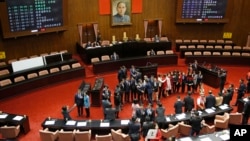Taiwan president-elect TsaiIng-wen must "prove" her Democratic Progressive Party (DPP) is not pro-independence before Beijing will deal with her, a senior member of China's largely rubber stamp parliament said on Thursday.
China considers self-ruled Taiwan a wayward province, to be brought under its control by force if necessary. Defeated Nationalist forces fled to Taiwan in 1949 after the Chinese civil war.
Beijing has repeatedly warned against any moves towards independence since January's landslide win by Tsai and her DPP in presidential and parliamentary elections. Tsai assumes office in May.
While the DPP's charter calls for the island's formal independence, senior DPP leaders have not publicly stated that clause of late and Tsai has said she wishes to have peace with China and to maintain the status quo.
Speaking on the sidelines of China's annual parliamentary session, Wang Yifu, who leads the Chinese-appointed Taiwan delegation to parliament, said the DPP's independence platform "makes the world feel uneasy".
Wang had been asked by a reporter to comment on Tsai's pledge to develop bilateral relations under the framework of Taiwan's constitution which stipulates that Taiwan and the Chinese mainland are part of "one China".
Tsai's pledge "contradicts" the independence clause in the DPP's own charter, Wang said, adding that she and the DPP would have to "prove (the DPP) is not a Taiwan independence party".
"This is the basis for cross-Strait exchanges," said Wang, who is also president of the All-China Federation of Taiwan Compatriots - a Chinese government group composed of Taiwanese exiles, defectors and their descendants.
The DPP did not respond to a request for comment.
China appoints a Taiwan delegation to parliament every year to back up its sovereignty claims over the island, even though nobody in proudly democratic Taiwan votes for them.
Wang stopped short of spelling out whether China wants the DPP to drop, revise or freeze the independence clause in its charter.
Wang urged DPP leaders to "appreciate and reciprocate the mainland's goodwill".
Chinese President Xi Jinping said last week China would never allow the historical tragedy of Taiwan being "split" off from the rest of the country to happen again, warning the island against any moves towards formal independence.
Japan ruled Taiwan as a colony for about five decades until the end of World War II. China's last dynasty, the Qing, had ceded Taiwan to Japan in 1895 after losing the first Sino-Japanese war.





